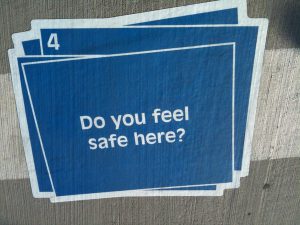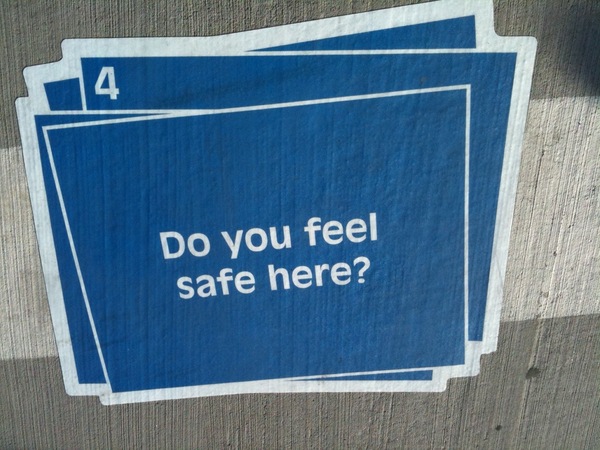by Alice Wilder
Once upon a time, my friends and I had to deal with a male teacher who liked to tell girls what to do with their bodies. One of my friends got a “talking to” about her dress, even though she was within the dress code, because–and this is a direct quote–“teenage boys have thoughts.” Another time, the whole class had to listen to a speech from him on the importance of girls “protecting” their virginity. And here’s what happened: when I walked past his class every day, I felt pangs of fear in my chest. Actually going to class felt like going into battle.
“talking to” about her dress, even though she was within the dress code, because–and this is a direct quote–“teenage boys have thoughts.” Another time, the whole class had to listen to a speech from him on the importance of girls “protecting” their virginity. And here’s what happened: when I walked past his class every day, I felt pangs of fear in my chest. Actually going to class felt like going into battle.
This is hardly an isolated incident: when I was sexually harassed during my driver’s education “Behind the Wheel” class, I didn’t report because I didn’t think teachers at my school would take the situation seriously. I regret it not reporting it now because the man who taught me drivers ed shouldn’t have a job. But I didn’t know then that my teachers would listen. They hadn’t marked themselves as safe people to report to. Who else has had these experiences and not reported them for the same reason? Is it any wonder that as I get ready for school every morning, I wonder if something–from an unwarranted speech on virginity to a joke about rape–will happen?
And if something does happen? I won’t be able to do anything. I will go to my next class and raise my hand a little less often than I usually would because I am focusing on keeping myself calm. I am focusing on helping my body feel safe. I am not focusing on Hamlet or geography. Later I might call my sister or friends to talk about it, but that doesn’t help me in the moment. My friends and I often talk about this feeling of isolation. After one of us deals with something, we often feel as if we are alone in our corner outside the cafeteria, left to try and help each other survive the day. We sprawl over the sidewalk and trade stories and advice. But often, it isn’t enough.
Teachers, this is where you come in. A few days after yet another incident with the virginity speech teacher, my friends and I were trading stories about him. Another teacher overheard us during this talk. She joined the conversation, letting us know that if we needed anything, we could come to her. We walked out of class that day relieved, joking about his ignorance instead of licking our wounds. Knowing that I had an ally at school was empowering.
Declaring yourself as an ally doesn’t need to be a public declaration, like “I SUPPORT YOU LADIES, I HAVE GOT YOUR BACK” at the beginning of every class. It can be something small, like a science teacher integrating lessons about female scientists, or any teacher gently calling out a casually offensive joke from a student. These are things that students will notice and file away.
I’m talking about sexual harassment and sexism, but this applies to anything. Students often deal with racism, homphobia, transphobia, and other things that make it difficult for us to feel safe and truly engage. Teachers have an incredible power to help us by making these things unacceptable in their classrooms.
If you’re an adult reading this, especially if you’re a teacher, here’s how you can be a better ally to your students:
- Listen first. Let your students tell you everything, or as much as they’re able to say. Listen first, then discuss how the situation can be dealt with.
- Take it seriously. If your student has gotten up the strength to talk to you, it’s important, no matter how minor it may seem to you. It is a terrible feeling to mentally prepare yourself to speak up only to be told that what you’re talking about not that big a deal, or that you ignore it and hope it stops.
- Hold off on the “should’ve/could’ve” advice. What your student could have or should have done matters less than what did happen, and can make them feel guilty about not handling the situation “properly.” Instead, talk about what can be done in the future, after this situation is resolved.
- Ask what your student wants to happen. Maybe they don’t want any consequences for the offending people or person, but they just need to make you aware of a situation. Or maybe they do want to see action taken. Ask what they want and need, and proceed accordingly.
Is it a teacher’s responsibility to be a therapist, or agree with a student’s views 100%? Definitely not. But making sure students feel safe in school is their responsibility.
I have allies at school now. But there was a time when I didn’t. During that time, I would raise my hand less often and take fewer chances because I was too busy trying to keep from leaving the room altogether. When I left the room to sit in a bathroom stall, hold my head in my hands, breathe deeply, and collect myself, I was missing out on education. That’s unacceptable.

Alice I love you, you’re legit such a fantastic person. And this story makes me sad as someone who is studying to be a teacher. The government/ general public might not find my chosen career path respectable but I personally take a lot of pride in wanting to be a teacher, and it’s very upsetting when people don’t hold up. But I like what you said about the helpful teacher, because it’s things like that, that really matter to students and I hope I remember that come 4 years.
stay gorgeous gurl <3
[…] How to be an Ally: A Guide for Teachers & Other Adults by Alice Wilder And if something does happen? I won’t be able to do anything. I will go to my next class and raise my hand a little less often than I usually would because I am focusing on keeping myself calm. I am focusing on helping my body feel safe. I am not focusing on Hamlet or geography. Later I might call my sister or friends to talk about it, but that doesn’t help me in the moment. My friends and I often talk about this feeling of isolation. After one of us deals with something, we often feel as if we are alone in our corner outside the cafeteria, left to try and help each other survive the day. We sprawl over the sidewalk and trade stories and advice. But often, it isn’t enough. […]
[…] people, being an anti-racist ally, a feminist ally, and many others. There are ally guides for teachers, for friends, and for the general public.Today, think about one of the common threads in a lot of […]